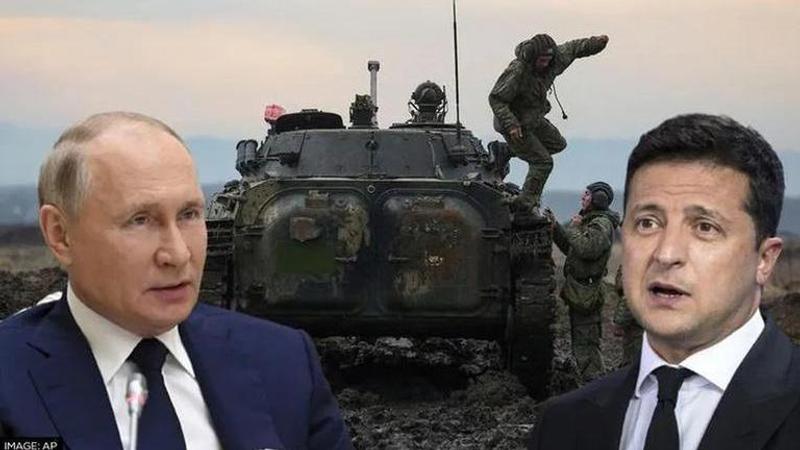Published 14:25 IST, February 14th 2022
Is Russian invasion of Ukraine imminent? World War 3 on the cards with the US leading?
Despite repeated denials to attacking Ukraine, Russia has continued to intensify troop build-up along the eastern Europe, spurring fears of probable attack.

As tensions between Russia and Ukraine continue to remain at their peak in years, Western powers have repeatedly warned Moscow against further aggressive moves against Ukraine. However, Kremlin has repeatedly denied claims of imminent attack and argues that increased military support of the North Atlantic Treaty Organisation (NATO) to Kyiv indicates a growing threat to Russian security in its western flank.
Despite repeated denial of invading Ukraine's "sovereignty and territorial integrity", Russia has continued to intensify troop build-up along the eastern European borders, thus sparking fears of a probable attack, which could wade into World War 3.
Recently, Russia conducted massive military drills with its "closest ally" Belarus. With France dubbing the exercises as a "violent gesture", Ukraine, last Thursday, accused Russia of blocking access to the sea for naval drills. Meanwhile, former Defence Minister of Ukraine, Andriy Zagorodnyuk, said that Moscow has "enough troops" in place to invade the ex-Soviet nation.
Noting the situation along the eastern European borders as "pretty dire", he further warned that the Russian military "could seize any city in Ukraine". However, he highlighted that despite the massive number of military amassed along the border, it is still "insufficient" for a full takeover and occupation of the country, the Guardian quoted the former military diplomat as saying.
Is Russia-Ukraine war possible?
According to the latest US intelligence reports, Russia has amassed over 130,000 troops along the eastern Ukraine border. The steady amassment of troops has "ratcheted up threats" of invasion of Kyiv "any time soon", US State Secretary Antony Blinken had said.
Citing the volatility of the security situation in Ukraine, which could "change at short notice", the New Zealand government has urged its citizens to leave Ukraine "immediately". The warnings came after the United States asked its nationals to fly out from Ukraine within "24 to 48 hours".
Britain has also urged its first nationals to move out from Ukraine. European Union (EU), on the other hand, had asked its non-essential staff to depart from the former Soviet state, without issuing a formal 'evacuation' notice. The orders come as US National Security Advisor (NSA) Jake Sullivan during a White House press briefing on Friday stated that there is intel suggesting "distinct possibility" of Russian invasion of Kyiv.
"I think prudence requires us to assume to plan for, and prepare for, a worst-case scenario and the worst-case scenario would obviously involve substantial Russian attacks on the Ukrainian capital," a senior state department official said, as quoted by The Guardian.
Meanwhile, according to Ukraine Defence Ministry assessment, as cited by CNN, Russia has deployed some 21,000 air and sea personnel transported Iskander operational-tactical missiles to the Ukrainian border and amplified its intelligence activity against the ex-Soviet nation.
In response, Ukrainian Military has also reportedly begun relocation of armaments and soldiers toward the line of contact in the conflict zone between Ukraine and Russia. According to Donetsk People's Republic spokesperson Eduard Basurin, Kyiv has initiated movement or S-300 missiles, rocket artilleries as well as foreign mercenaries along the borders separating self-proclaimed republics of Luhansk and Donetsk.
Pointing to Kyiv's official term for its military operation in the Donbas, Basurin added that an S-300 anti-aircraft missile battalion was relocated from the Odesa region and stationed at the Kramatorsk airbase to cover the command center of the Joint Forces Operation (JFO)'s headquarters.
What could be the consequences?
As tensions intensify with both parties engaged in hostile rhetorics, leaders of western nations have discussed the situation with their Russian counterparts with no concrete resolution to quell the crisis. Without mulling over plausible strategies to de-escalate the standoff, involved parties, that is the US and its European allies have only amped up its warnings of stringent economic sanctions against Russia. In a last-ditch effort to fend off Russian aggression, the US President Joe Biden during an hour-long phone call on Saturday with Kremlin head Vladimir Putin warned that US "will respond decisively and import swift and severe costs on Russia," White House said in a statement.
On the other hand, with US and NATO refusing to recognise Russia's 8-point security guarantees proposed last December, Kremlin has also warned of an adequate response against "aggressive Western politics."
Although threatened by Ukraine's ambitions to join NATO, Russia aims to revive its influence on Europe, which was stained after Moscow invaded and annexed the Crimean Peninsula in 2014. So to mention, US NSA Jake Sullivan and UK PM Boris Johnson "do not believe" that Putin has "yet decided" to invade Ukraine.
However, the Russian presence in "temporarily occupied territories" of Ukraine poses a threat to its national security. While the London Chatham House-based think tanks believe war is currently "tremendous" for Russia, it is also true that Moscow is serious about protecting its "red lines".
To conclude, while an overall larger threat of World War 3 looms, Ukraine and Russia-backed rebels have sporadically engaged in over conflicts since 2014.
As per UN figures, there have been over 3,000 civilian deaths in such clashes since then. Despite repeated warnings and several rounds of talks, Russia has continued to escalate its unabated military build-up at Ukraine borders, with Russian Foreign Minister Sergei Lavrov saying that "a country moving troops across its own territory should not be cause for alarm".
(Image: AP)
Updated 14:45 IST, February 14th 2022




